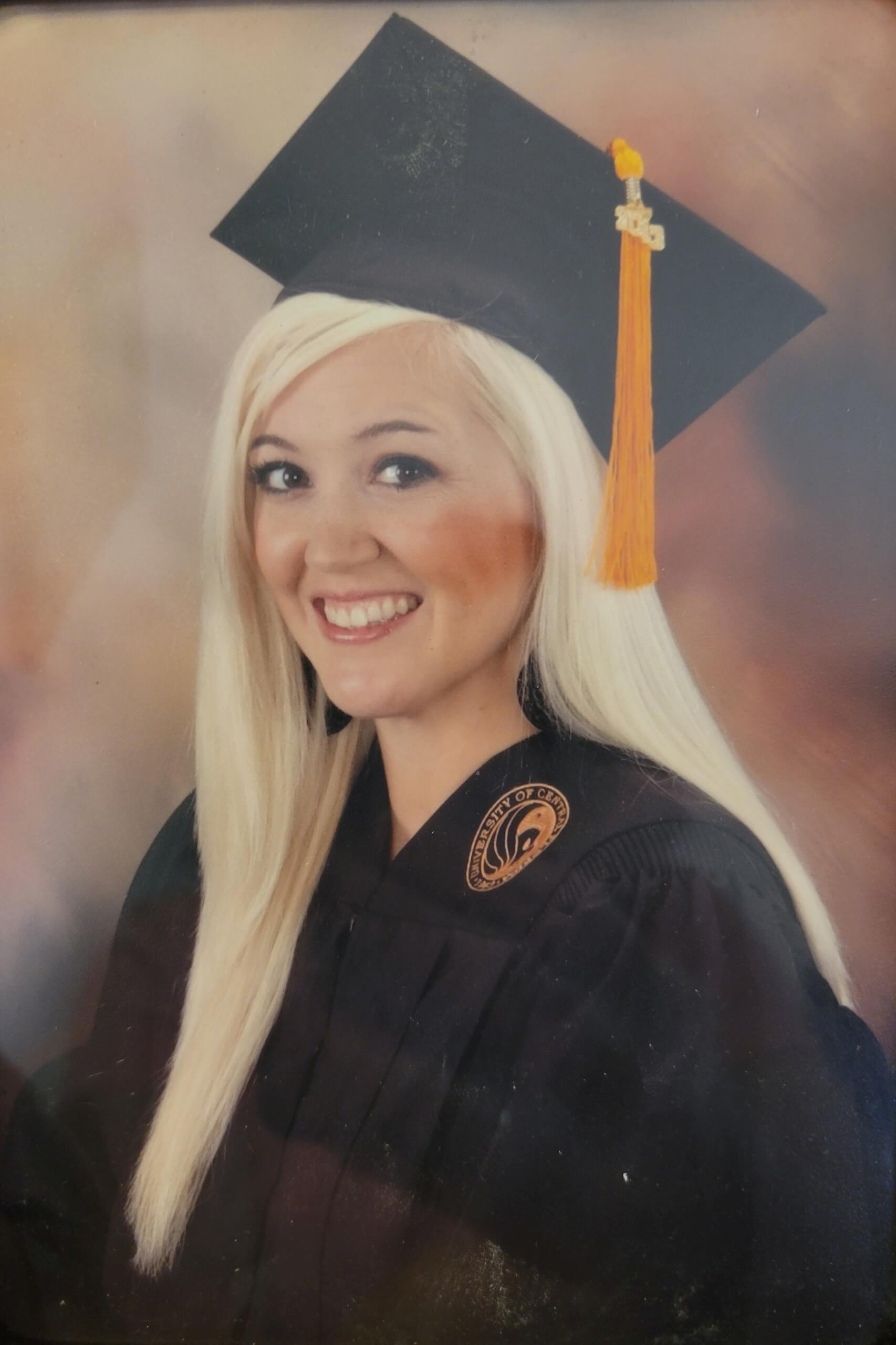Loretta Thermenos Establishes Legacy Gift to Honor Her Husband, Paris Thermenos ’73
Loretta Thermenos, who lost her beloved husband, Paris ’73, in 2018, understands the difficulties facing individuals who have health conditions or impairments that affect their quality of life. Through her generosity through the establishment of the Paris Thermenos Fund, she hopes to lessen the burdens that individuals like Paris, a paraplegic, endured. She is also aware of the toll such conditions have on an individual’s ability to obtain the skills necessary to overcome those challenges and prays that this endowment eases their path.
A Workplace Romance
“She’s the one,” Paris Thermenos told his co-workers as Loretta Conrad was making copies at a General Dynamics office near UCF. Paris’s busy-body colleagues were always trying to set him up. Young, smart, and handsome – Paris was definitely a catch.
Loretta was working fulltime and a romance was not on her radar. She grew up in Sanford with two sisters under the watchful eye of their parents. A student at Seminole Community College, she had wanted to live in off-campus housing. Nope, said her father. Her father was a Navy veteran, and her mother was born in Northern Ireland. It was the era of the Vietnam War, political assassinations, riots, drugs and hippies. It was a different time. They were determined to keep their daughters safe.
But then, Paris received an award from the company, and Loretta noticed him. He seemed like a good guy. She sent him an inter-office mail that said, “Is Paris Burning? – L” a reference to a popular book of the day, as a way of letting him know that she wouldn’t mind getting to know him. When Paris passed by the next day, he said, “Yes.”
“We both smiled, and he kept going,” Loretta recalls. The brief note and his response were inscribed in their wedding bands. She still has the note, framed as a keepsake that she gave to Paris as a gift, years later. It was the best gift he’d ever received, he told her.
“He was studying chemistry at USF at the time and told me later his mother thought all her sons should be doctors, whether they wanted to or not. Paris was smart enough to do whatever he wanted to do, but he was not really interested in medicine.”
At the moment, he was interested in Loretta.
When Paris got up the nerve to ask Loretta for a date – a double date, at that – she still had to convince her parents that Paris was a nice guy with good intentions. The location of the date at a drive-in movie theater in Sanford almost caused her parents to put the kibosh on the outing, but they relented.
Turns out, Loretta and Paris didn’t even watch the movie. They spent the entire evening talking about their hopes and dreams for the future, and their lives before they met.
They were falling in love.
The two had grown up less than five miles apart but had never met. They had gone to different schools, and the interstate system had not yet been expanded to Seminole County.
Paris and his large family had lived on what was then a 25-acre orange grove nearby. Paris not only learned the value of hard work, but he also was exercising his mind.
“Paris was just so smart,” Loretta says. “He could figure out how anything worked – and how to improve it.”
Back in the early 1960s, not many of the roads in Lake Mary were paved, making travel between communities that much more difficult. Still, the rolling hills and bucolic landscape appealed to Loretta, and she told Paris early on how she wanted to live there one day. After his retirement, they built a vacation home there, and that was just one of her dreams that Paris made come true, Loretta says.
Overcoming Tragedy
“Paris told me that he rode his bicycle on I-4 before they opened it, and most of the roads leading up to it were just dirt. And every time it rained, it would create deep gouges in the dirt roads that caused your car to bottom out whenever you drove on them.”
Paris also told Loretta about his accident. He was in his second semester at the University of South Florida and had come home for the weekend to visit.
The older car in which he was a passenger was not equipped with seat belts. They did not become mandatory until 1968, the year of Paris’s accident.
It’s unclear what caused the accident. Paris, who had been riding in the back seat, remembered trying to sleep. The next thing he knew, he was on his way to the hospital. The impact had severely damaged Paris’s back and spinal cord, causing permanent paralysis to his lower limbs.
“Paris said that he had to re-learn how to do everything,” Loretta says of his five months at Florida Hospital. “He couldn’t sit up, he had lost his ability to tell his body to get up, and of course, he had lost the use of his legs.”
Before the accident, Loretta says, Paris had been so strong and active. Working on 25 acres had instilled within him the value of physical fitness.
“I think any of us, if we were to go to the hospital for five months for anything, we would be shocked at how long it would take to rebuild our strength.”
Paris Overcomes
Paris was determined to get back to doing all the things he loved, especially driving. But as Paris told Loretta, back then, no one was teaching paraplegics how to drive. Paris’s parents helped him the best way they knew, but their medical knowledge was limited, and they simply didn’t have the resources.
So, he figured out how to do it himself.
He knew that he needed hand controls for his car. Paris was a young man, and he believed that if he were going to accomplish his goals, the ability to drive himself would be invaluable. He installed the hand controls himself and taught himself how to load and unload his wheelchair into his car unaided.
Sometimes, Loretta says, her unknowing friends would assume that she was the driver in the family. She would just laugh and tell them about the time he drove all the way to and from California twice in one summer.
Paris won a science fair when he was 14 with a motor he had designed. If he hadn’t become a financial whiz, Loretta says he would have been a great inventor. He had a knack for noticing how things could be improved.
“His curiosity always got the better of him,” Loretta says. “But his personality was that he was always looking for solutions for everything he was facing in life.”
His ultimate goal was to go back to school, Loretta says. “He couldn’t imagine staying at home for the rest of his life. ‘I want to live a full and independent life,’” he told her.
Independence was so important to Paris, Loretta says, and not because of his ego. It was because he had to be prepared for any unforeseen obstacle, like having your wheelchair tire go flat. When that actually happened at school, Paris had to figure out a way to get to his car where his repair kit was kept, and then he fixed it.
Paris comes to UCF
On their first date, Paris told Loretta that people like him had a life expectancy of about 25 years after they had sustained their accident. He lived for more than 50 years after his accident because he was intentional about keeping himself healthy. Loretta says that he focused on his diet and exercise to keep his weight down; he knew that the more he weighed, that the harder it would be on his body.
“If it hadn’t been for his accident, I believe that Paris would have lived to be 100 because of his devotion to his health,” Loretta says.
In general, individuals with paraplegia – paralysis of the legs and lower body – have a shorter life span than those without, according to a 50-year study published by the National Institutes of Health. The study also found that survival was “related strongly to extent of neurological impairment.”
Paris’s keen mind allowed him to propel himself to places his legs could not. He received dual degrees in accounting and finance and graduated with honors.
At his commencement ceremony in 1973, students were seated in the iconic fountain near Millican Hall, and a decision was made to seat Paris near the speaker’s dais. That placement put him in the pathway of that year’s keynote speaker, President Richard Nixon, who stopped to greet Paris and touched him on his shoulder. They briefly chatted. “What’s a good-looking man like you doing back here?” Nixon asked him. The widely circulated photograph remains one of Loretta’s most treasured memories.
Loretta and Paris married shortly after his graduation. She joked to him that the wedding was going to be anticlimactic after his brush with fame at graduation.
And even though meeting Nixon was a highlight of Paris’s life, it probably only happened because of his disability. There were other incidents throughout his life that he and Loretta had to overcome.
“I can’t tell you how many times we had to enter a restaurant through the kitchen because they didn’t have an accessible entryway,” Loretta says.
But it was not in Paris’s character to complain about such things. “He was always looking for solutions,” Loretta says. “He was always trying to figure out how he could do things by himself, and teaching other people to learn how they could also be independent. It’s as if his early years had prepared him for the life he was to live.”
Paris’s Determination
When Paris was injured, there were not a lot of rehabilitation options in the area for people like him. As word spread of his remarkable recovery and adaptive skills, people in the community occasionally reached out to him for advice.
Teaching others how to better their circumstances was one of Paris’s greatest joys. “He would say, ‘If I can do this, you can do this,’” Loretta says. “He could do whatever he set his mind to.”
Neither Paris nor Loretta came from a wealthy family; they both knew they would have to work hard to make a living.
And even though Paris landed a job in the banking industry after graduating from UCF, he also knew that earning a master’s degree would be better for his career. As he began rising through the company, he began researching the best schools for his MBA, and chose Stanford University in California.
Paris could have gone anywhere for his graduate degree but thought the warmer climate in California would be more hospitable for someone who had to navigate life with a wheelchair.
“He was the only paraplegic in his class,” Loretta says. Because of the grueling curriculum, students were not allowed to work during the term. And when his classmates took the summers off for vacation or to visit their families, Paris got a job.
Loretta also struggled to find work, and housing options were often not available for handicapped students. Once, their only option was a second-floor apartment that had no elevator access. They signed the lease.
“Those were difficult years,” Loretta says. The couple continued to persevere despite the obstacles stacked against them and began building lasting connections that would help them later in life.
‘Phenomenal Success’
When Paris graduated from Stanford, doors began to open for him, and he achieved phenomenal success in the financial industry in very little time, Loretta says.
He had five offers after graduating, and the couple ended up in Los Angeles. Out of the five offers, Paris decided to accept a position at Security Pacific National Bank where he discovered an aptitude and love for investment banking. Eventually, Paris was put in charge of the investment portfolio for Barnett Banks. Because of Paris’s uncanny ability to figure out how things worked, whether mechanically or mathematically, he became so successful that he and Loretta were able to retire when he was 48.
“I always knew he was special,” she says. “He was passionate about life and wanted more out of life than anyone I had ever met. And as time went on, I couldn’t imagine him not being in my life.”
After his retirement, Paris and Loretta enjoyed traveling throughout the world; they even skied in Colorado, thanks to adaptive snow skis that Paris engineered. They also talked about how to help other individuals who may find themselves with a health issue of some kind and want to get an education but may not have the resources to do so.
Paris and Loretta never dwelled on the challenges they had faced along the way, but they were cognizant of the issues that many others with disabilities encounter during their lives.
Lifechanging Legislation
The car accident that changed the course of Paris’ life occurred in 1968. It was not until 1990 that the Americans with Disabilities Act was passed that mandated that new facilities must be designed and constructed to be readily accessible to and usable by persons with disabilities. The UCF campus today is much more accessible to students in wheelchairs. While the physical spaces are accessible, the goal is to ensure that all UCF Knights have a sense of belonging.
There was pushback to the ADA, notably in March 1990 when more than 1,000 people marched from the White House to the US Capitol to demand that it be passed. Dubbed the Capitol Crawl, about 60 individuals cast aside their wheelchairs and other mobility aids and crawled up the Capitol steps. It’s a journey that continues for many with disabilities.
Paris’s Legacy
Paris graduated FTU (UCF) in May 1973. In honor of what would have been his 50th reunion, Loretta shared that she has made a gift in her living trust to create the Paris Thermenos Fund for UCF.
“As I look back,” Loretta says, “I saw what our life together had been and it has been a wonderful gift. I never dreamed that we would be in a position where we could help others transform their lives.”
The idea of advancing workplace initiatives to help people with disabilities was highlighted in a 2018 UCF article. The article illustrates that people with disabilities are not bound by their minds, just their bodies. It’s a sentiment that Loretta hopes will be amplified through her generosity.
“Paris wanted students need to know that there’s somebody there, something that they can tap into to help them,” Loretta says. “And even though Paris is no longer here, knowing that many other students will benefit from his sacrifices throughout the years is such a blessing to me. I am grateful for this opportunity to share Paris’s legacy, and to know that it will continue forever.”


